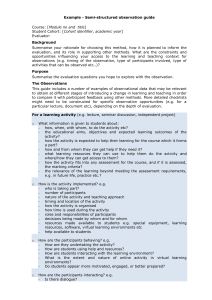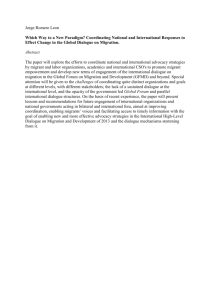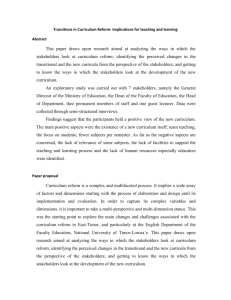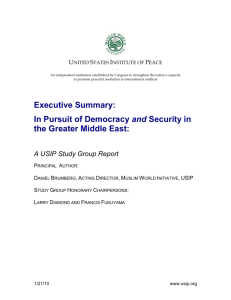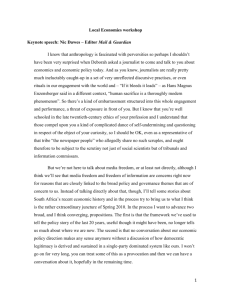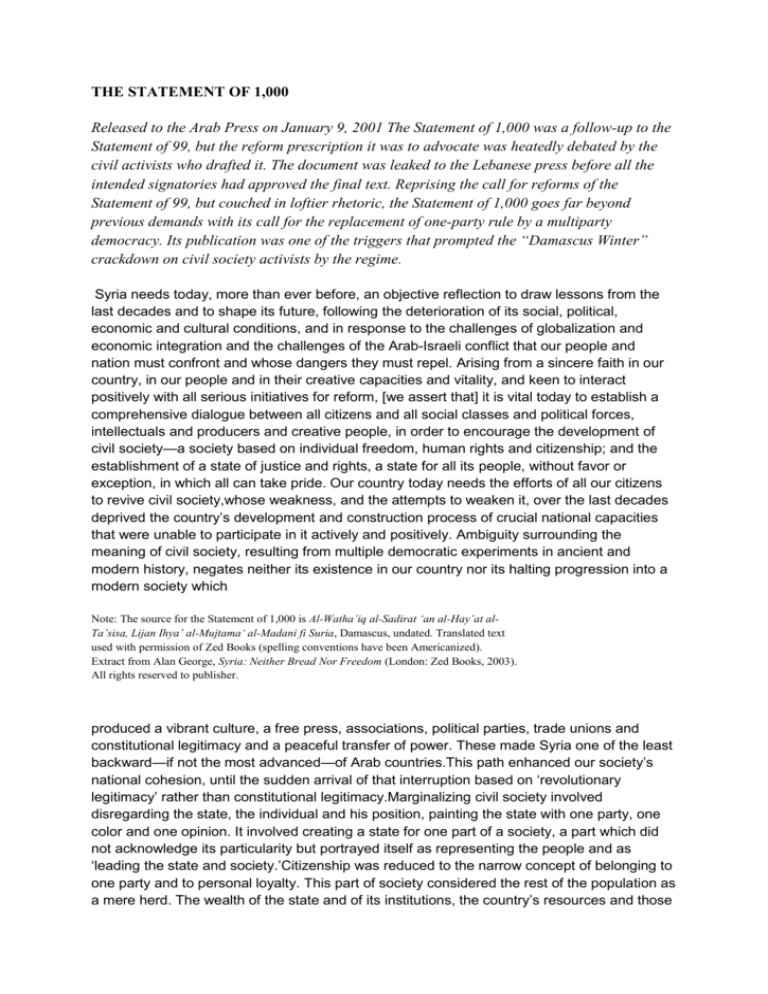
THE STATEMENT OF 1,000
Released to the Arab Press on January 9, 2001 The Statement of 1,000 was a follow-up to the
Statement of 99, but the reform prescription it was to advocate was heatedly debated by the
civil activists who drafted it. The document was leaked to the Lebanese press before all the
intended signatories had approved the final text. Reprising the call for reforms of the
Statement of 99, but couched in loftier rhetoric, the Statement of 1,000 goes far beyond
previous demands with its call for the replacement of one-party rule by a multiparty
democracy. Its publication was one of the triggers that prompted the “Damascus Winter”
crackdown on civil society activists by the regime.
Syria needs today, more than ever before, an objective reflection to draw lessons from the
last decades and to shape its future, following the deterioration of its social, political,
economic and cultural conditions, and in response to the challenges of globalization and
economic integration and the challenges of the Arab-Israeli conflict that our people and
nation must confront and whose dangers they must repel. Arising from a sincere faith in our
country, in our people and in their creative capacities and vitality, and keen to interact
positively with all serious initiatives for reform, [we assert that] it is vital today to establish a
comprehensive dialogue between all citizens and all social classes and political forces,
intellectuals and producers and creative people, in order to encourage the development of
civil society—a society based on individual freedom, human rights and citizenship; and the
establishment of a state of justice and rights, a state for all its people, without favor or
exception, in which all can take pride. Our country today needs the efforts of all our citizens
to revive civil society,whose weakness, and the attempts to weaken it, over the last decades
deprived the country’s development and construction process of crucial national capacities
that were unable to participate in it actively and positively. Ambiguity surrounding the
meaning of civil society, resulting from multiple democratic experiments in ancient and
modern history, negates neither its existence in our country nor its halting progression into a
modern society which
Note: The source for the Statement of 1,000 is Al-Watha’iq al-Sadirat ‘an al-Hay’at alTa’sisa, Lijan Ihya’ al-Mujtama‘ al-Madani fi Suria, Damascus, undated. Translated text
used with permission of Zed Books (spelling conventions have been Americanized).
Extract from Alan George, Syria: Neither Bread Nor Freedom (London: Zed Books, 2003).
All rights reserved to publisher.
produced a vibrant culture, a free press, associations, political parties, trade unions and
constitutional legitimacy and a peaceful transfer of power. These made Syria one of the least
backward—if not the most advanced—of Arab countries.This path enhanced our society’s
national cohesion, until the sudden arrival of that interruption based on ‘revolutionary
legitimacy’ rather than constitutional legitimacy.Marginalizing civil society involved
disregarding the state, the individual and his position, painting the state with one party, one
color and one opinion. It involved creating a state for one part of a society, a part which did
not acknowledge its particularity but portrayed itself as representing the people and as
‘leading the state and society.’Citizenship was reduced to the narrow concept of belonging to
one party and to personal loyalty. This part of society considered the rest of the population as
a mere herd. The wealth of the state and of its institutions, the country’s resources and those
of the institutions of civil society, became like feudal estates that were distributed to followers
and loyalists. Patronage replaced law; gifts and favors replaced rights; and personal interests
replaced the general interest. Society was desecrated, its wealth plundered and its destiny
commandeered by those who became symbols of oppression. Every citizen became a
suspect, if not actually considered guilty, to be apprehended at will. The regime treated
people not only as a neglected mass, subject to its will, but also as minor, incompetent and
under suspicion. The government went so far as to accuse people of treason whenever they
took the smallest initiative to express their opinion or demand their rights. It should be
mentioned that marginalizing civil society led to marginalizing the state itself,underlining the
organic relationship between them as neither exists without the other. Civil society
constitutes the very substance of the modern state, while the state is civil society’s political
expression. Together, they constitute the democratic system of government. Our society,
with its national revolutions against colonialism and its political movement against political
oppression; and which revealed its patriotic and nationalist spirit, eager for liberation and
progress; which has been patient and has given many martyrs and sacrifices for freedom
and justice, is still capable of rebuilding its social and political life; of rebuilding its economy
and culture according to the requirements of modernity and development. It is still capable of
joining the march of scientific and technological progress, and can overcome the
relationships and structures that produce tyranny and that are intimately linked to the
imperialism and national fragmentation that were their cause.
The consequences of coups against political democracy in the name of socialism are now
plain.With the collapse of the Soviet model and its East European and Third World
extensions, the impossibility of building socialism or establishing social democracy without
political democracy became obvious. The Soviet experience also demonstrated the fragility
of a state that does not draw its legitimacy from civil society, and of an authority that does not
draw its legitimacy from the people. Equally plain is the inadequacy of viewing the people as
mere subjects of ‘revolutionary will,’ and of denying the social, cultural and political diversity
of a society and the different interests of each of its component parts. The Soviet experience
underlined the consequences of denying that rule of law—as a judicial expression of public
order and of the essence of the state itself, as well as expression of all that is common
between all citizens and social groups—is an historic compromise between all those interests
and diverse groups that should be the basis for genuine national unity. It is this historic
compromise which creates constitutions and laws that are in line with the development of
society, which itself is affected by the pace of global development. Constitutions are
therefore usually modified, changed and improved according to the needs of that
development. The concept of civil society in the world to which we belong—geographically at
least—that was revived in the 1970s, represented, and still represents, the reality of societal
existence, the latter being defined by the transition of mankind from Nature to society, that is,
to human construction and civil politics, to use the expression of [the medieval Arab historian]
Ibn Khaldoun. From this concept arose an array of concepts leading to a ‘social covenant’ as
opposed to the ‘divine right’ claimed by dictators, kings and emperors. The development of
this social covenant is nothing more that the political counterpart of the triumph of reason
which placed the human being at the center of human knowledge. Modern societies and
modern thinking gave rise to the modern civil state that guarantees freedom of belief and
religious practice and unrestrained thought—all within the framework of acknowledging, in
practice, a freedom defined by law, conditioned by responsibility and crowned by the creative
initiative, love of knowledge and [the spirit of] working with and for the wider group. For all
these reasons there is a great need today to revive societal and social institutions free of
domination by the executive authority and by the security apparatus, which usurped full
powers. These institutions should also be free of all traditional forms of social ties,
relationships and structures, such as those of tribalism and sectarianism, in order to reestablish politics in society as its primary free, conscious and constructive activity, and to
achieve the crucial balance
between society and state, co-ordinating their activities and thus achieving liberty,equality
and justice. National unity is thus bolstered, as is the dignity and sovereignty of the state.
The rule of law becomes the final arbiter for all. Only in civil society can a comprehensive
national dialogue characterized by freedom of expression and speech and respect for
diverse opinions be conducted, in order to encourage mass participation for the benefit of all
the people.No social or political group has the right to decide by itself where the country’s
national interests lie, and what means should be pursued to achieve those interests. All
groups—including the present ruling power—must make their opinions, ideas and programs
known to the people for discussion and dialogue.
No dialogue is possible without freedom of opinion and expression, free political parties and
trade unions, a free press, free social organizations and a legislature that genuinely and
effectively represents the people. No reform is possible without a comprehensive national
dialogue because dialogue always produces new facts that are relevant to all. The logic of
dialogue negates that of holding a monopoly on truth, patriotism, or any other
monopoly. That is why we are calling for the adoption of the principle of dialogue,
constructive criticism and peaceful development to resolve all disagreements through
compromise and understanding. This is one of the most important characteristics and
advantages of civil society. The vitality of civil society is strikingly manifested in the
establishment of voluntary, independent, non-governmental organizations based on
democratic choice, whose objective is the establishment of justice and the rule of law that
ensures civil rights and protects general liberties. That is why we believe that in defending
civil society we defend the state and the authority holding power in that state. For economic
reforms and anti-corruption measures to succeed, they must be preceded and accompanied
by a comprehensive package of political and constitutional reforms. Otherwise these reforms
will not achieve their objectives. The economic and anti-corruption reform process therefore
must develop into a permanent legal mechanism that stimulates public participation and
encourages a continuous monitoring of state institutions as well as the private sector. All this
should be done in an atmosphere of transparency that offers all social groups and forces and
political parties the opportunity to participate effectively in the processes of planning,
preparation, implementation and correction. It will also enable them to identify mistakes,
waste and corruption promptly, as well as enabling the judicial system and supervisory
bodies to call miscreants to account. Partial and selective measures will not lead to reform
Our philosophy and practice consider that:
—human beings are aims unto themselves
—freedom, dignity, welfare and happiness are the purpose of development and progress
—national unity and the general interest are yardsticks for all policies and practices
—all citizens are equal before the law, since inequality always creates those who are
privileged and those who are deprived of all rights, thus sowing the seeds of discrimination
and disunity and degrading social relations to subpolitical levels
The foundations of our philosophy and practice are that:
—the correct practice of politics is that based on patriotic, national and human interest rather
than on private interests
—national achievements are attributable to the people, not to individuals
—social groups and political parties are defined by the entire national socialentity
—the people are the sources of all powers
We therefore believe that political reform is the necessary and only way out of the current
state of stagnation and decline, and the only way of extricating the general administration
from its chronic torpor. We believe, furthermore, that the following must be implemented
urgently as necessary preludes to political
reform:
1. Abrogation of the Emergency Law now in force. Martial law regulations, emergency courts
and all similar measures must be cancelled forthwith, and all injustices they caused over the
years remedied. Political prisoners must be released, and the situation of those deprived of
civil and labor rights by special courts and laws must be rectified. Exiles must be allowed to
return.
2. Political freedoms—especially freedom of opinion and expression—must be allowed. Civil
and political life must be overseen by democratic legislation regulating activities of political
parties, associations and non-governmental organizations—especially the trade unions
which, through their conversion into state institutions, have lost partly or entirely the very
reasons for theirestablishment.
3. Reinstatement of the publications law ensuring freedom of the press that was annulled by
the State of Emergency.
4. Enactment of a democratic election law to regulate elections at all levels in a way that
ensures all segments of society are represented fairly, and the electoral process should be
subjected to the supervision of an independent judiciary. The parliament elected as the result
of this process will be a genuine legislative and supervisory institution, truly representing the
will of the people, acting as the highest authoritative reference for all and symbolizing the
people’s membership in the country and their positive participation in deciding how it is
governed. The wholeness of the state is never expressed more clearly than by the legislative
institution and by the independence and integrity of the judiciary.
5. Independence and integrity of the judiciary with laws applied equally to rulers and ruled.
6. Ensuring that citizens are accorded their full economic rights, most of which are stated in
the Constitution. The most important of their constitutionally
guaranteed rights are
(i) a fair share of national wealth and income;
(ii) suitable employment and a life of dignity; and
(iii) protecting the right of
future generations of their fair share of the country’s wealth and to a clean
environment.Economic and social development are senseless if they are not aimed at
erasing injustice, humanizing conditions of work and life and countering unemployment and
poverty.
7. Insisting that the parties affiliated to the Progressive National Front (PNF) truly represent
the most vibrant forces in Syrian society; that they by themselves today fill the vacuum of
Syrian politics; and that the country needs nothing more than the reinvigoration of the PNF
will serve only to perpetuate further the social and economic stagnation and political
paralysis. It is imperative to review the relationship of the PNF with the government, to
reconsider the concept of ‘the leading party in society and the state,’ and to review any other
concept that excludes the people from political life.
8. Abolition of legal discrimination against women. Stemming from a desire to participate
constructively in the process of social development and reform,we call for the establishment
of committees for reviving civil society in all sectors of Syrian life as a continuation and
development of the concept of the ‘friends of civil society.’ From a sense of national
responsibility and independence, we hope that these committees will play their part in
overcoming the negativity and demoralization, and [enabling Syria to] emerge from the
stagnation that doubles our backwardness in relation to the pace of international
development. Through these committees,we hope to take the step to a free, independent
and democratic society that takes part in laying the foundations for a renaissance that will
ensure a better future for the Arab nation.





